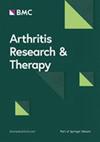Association between rapid and sustained remission and clinician- and patient-reported outcomes in patients with rheumatoid arthritis: post hoc analysis of data from the SELECT-COMPARE study
IF 4.6
2区 医学
Q1 Medicine
引用次数: 0
Abstract
Rapid remission has been shown to be beneficial in patients with early rheumatoid arthritis (RA). This study assessed the association of rapid and sustained remission with long-term clinician- and patient-reported outcomes (CRO/PROs) in patients treated with b/tsDMARDs. This post hoc analysis used pooled data on patients with moderately-to-severely active RA receiving upadacitinib or adalimumab from the SELECT-COMPARE trial (NCT02629159) and its open-label long-term extension (up to 5 years). This study assessed the effect of achieving rapid remission, time to remission, and time in sustained remission on CRO/PROs. Rapid remission was defined as a Disease Activity Score 28 with C-reactive protein (DAS28-CRP) < 2.6 after 12 weeks’ treatment. The outcomes of interest included a variety of PROs, such as pain, fatigue, quality of life, and CROs (28 swollen/tender joint counts). Where available, outcomes were assessed for up to 5 years; mean change in outcomes, as well as adjusted odds ratios (aOR) of achieving minimal clinically important differences (MCIDs) or normative values. Multivariate regression analyses were conducted adjusting for baseline covariates. In total, 28% of patients (n/N = 247/865; mean disease duration: 8.2 ± 7.8 years) achieved rapid remission. Rapid remission was associated with significantly greater improvements from baseline in all outcomes at Week 26 and significantly greater odds of achieving MCIDs (aOR range: 2.2–5.6) or normative values (aOR range: 1.6–9.8) in most PROs, including pain, fatigue, and physical functioning, over the variable 5-year follow-up; significantly lower swollen/tender joint counts were also observed. Time to achieve remission was associated with better outcomes: for every month delay in achieving remission, likelihood of achieving MCIDs or normative values decreased, on average, by 13%. Increasing time spent in sustained remission was associated with long-term improvement in CRO/PROs. Remission is a key outcome in RA; this study showed that achieving rapid remission, as well as reducing time to achieving remission, was associated with less pain and fatigue, and better physical functioning and quality of life over 5 years. Similarly, increasing time spent in sustained remission correlated with sustained improvement in CRO/PROs. Striving for rapid, sustained remission leads to long-term benefits.类风湿性关节炎患者快速和持续缓解与临床医生和患者报告的结局之间的关系:SELECT-COMPARE研究数据的事后分析
快速缓解已被证明对早期类风湿关节炎(RA)患者有益。本研究评估了b/tsDMARDs治疗患者的快速和持续缓解与长期临床医生和患者报告的预后(CRO/PROs)的关系。这项回顾性分析使用了SELECT-COMPARE试验(NCT02629159)中接受upadacitinib或adalimumab治疗的中度至重度活动性RA患者及其开放标签长期延长(长达5年)的汇总数据。本研究评估了快速缓解、缓解时间和持续缓解时间对CRO/PROs的影响。快速缓解定义为治疗12周后疾病活动评分28,c反应蛋白(DAS28-CRP) < 2.6。关注的结果包括各种PROs,如疼痛、疲劳、生活质量和cro(28个肿胀/压痛关节计数)。在可能的情况下,对结果进行长达5年的评估;结果的平均变化,以及达到最小临床重要差异(MCIDs)或正常值的调整优势比(aOR)。对基线协变量进行多变量回归分析。28%的患者(n/ n = 247/865;平均病程:8.2±7.8年)快速缓解。在可变的5年随访中,26周时所有结局的基线改善均与快速缓解相关,并且在大多数PROs中,包括疼痛、疲劳和身体功能,达到MCIDs (aOR范围:2.2-5.6)或正常值(aOR范围:1.6-9.8)的几率显著增加;肿胀/压痛关节计数也明显降低。达到缓解的时间与更好的结果相关:达到缓解的时间每延迟一个月,达到MCIDs或正常值的可能性平均下降13%。持续缓解时间的增加与CRO/PROs的长期改善相关。缓解是类风湿关节炎的关键结果;这项研究表明,实现快速缓解,以及减少达到缓解的时间,与减少疼痛和疲劳,更好的身体功能和5年的生活质量有关。同样,持续缓解时间的增加与CRO/PROs的持续改善相关。争取快速、持续的缓解会带来长期的好处。
本文章由计算机程序翻译,如有差异,请以英文原文为准。
求助全文
约1分钟内获得全文
求助全文
来源期刊

Arthritis Research & Therapy
RHEUMATOLOGY-
CiteScore
8.60
自引率
2.00%
发文量
261
审稿时长
14 weeks
期刊介绍:
Established in 1999, Arthritis Research and Therapy is an international, open access, peer-reviewed journal, publishing original articles in the area of musculoskeletal research and therapy as well as, reviews, commentaries and reports. A major focus of the journal is on the immunologic processes leading to inflammation, damage and repair as they relate to autoimmune rheumatic and musculoskeletal conditions, and which inform the translation of this knowledge into advances in clinical care. Original basic, translational and clinical research is considered for publication along with results of early and late phase therapeutic trials, especially as they pertain to the underpinning science that informs clinical observations in interventional studies.
 求助内容:
求助内容: 应助结果提醒方式:
应助结果提醒方式:


